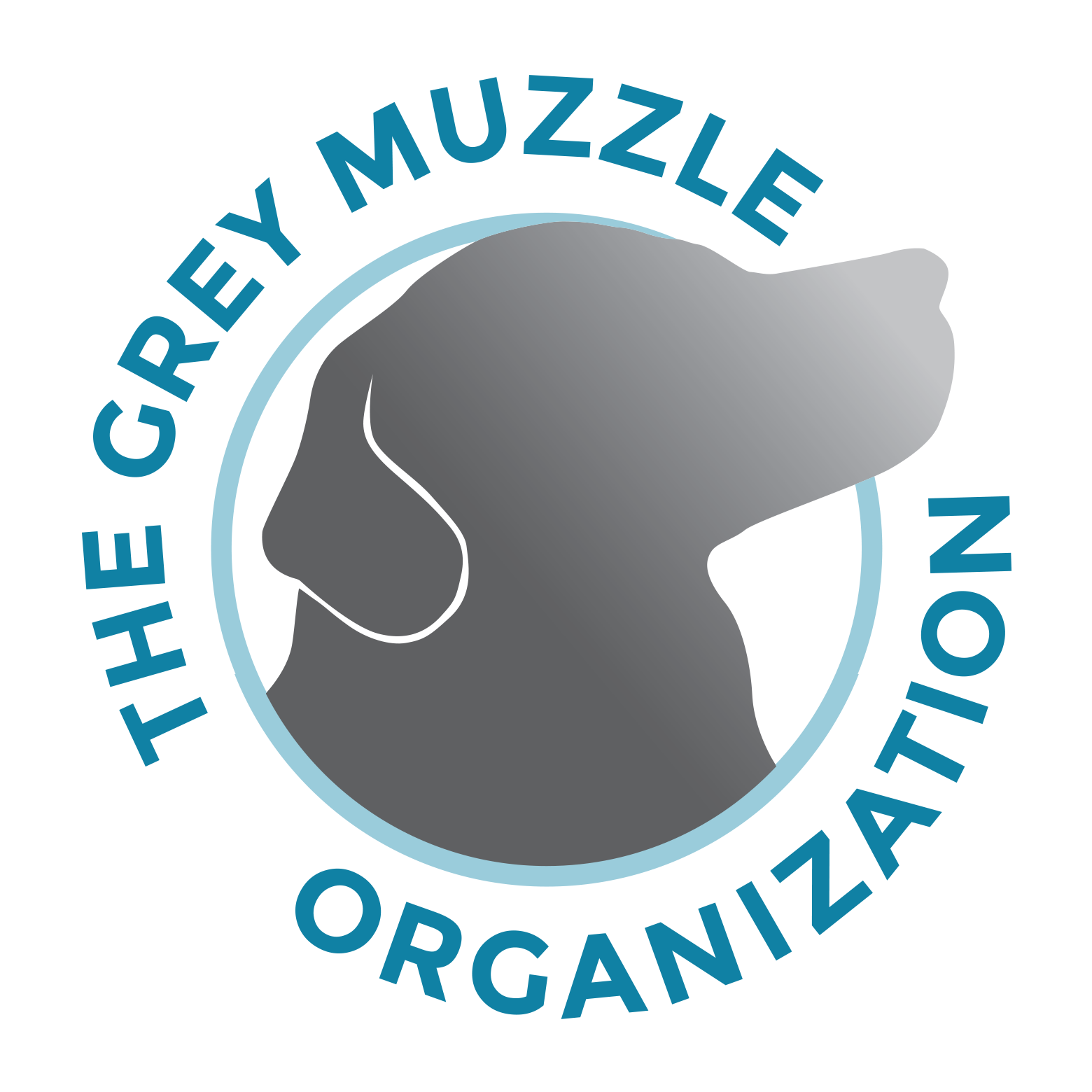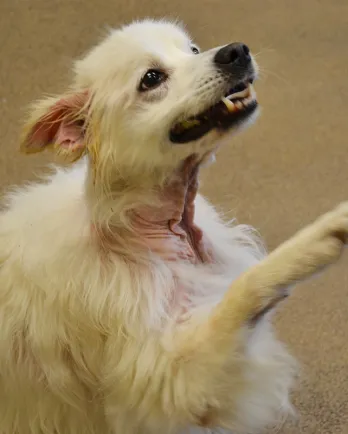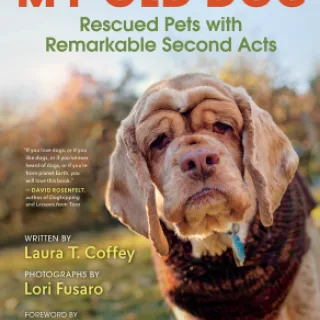Lollypop Farm, the Humane Society of Greater Rochester: A Sweet Deal for Animals...and the People Who Love Them
Like candy, organizations that help senior dogs come in different colors and flavors. Some operate on a shoestring, while some have six-figure budgets. Some are foster based, while others have shelter facilities. And some coalesced recently, while others have built their organizations over decades. These programs' commonalities, however, are greater than their differences, and their shared goal, as succinctly expressed by Kelly Wolfe, is "to keep animals with people."
Wolfe is Manager of Corporate and Foundation Relations for one such organization, the Humane Society of Greater Rochester, one of the only truly open-admission shelters in Western New York. Covering about 20 counties--from the Southern Tier to Lake Ontario and from Buffalo to Syracuse--the organization is open to any animal in need no matter where it comes from. This ambitious mission and comprehensive reach are belied by the whimsical name by which people in the region know it: Lollypop Farm.
Mission and History: Compassion and Respect
Working with a staff of nearly 100 people and a volunteer force many times that, Lollypop Farm is unique in the sheer scope of the work it performs and the community it serves--all while receiving no governmental funding. Now in its 144th year, Lollypop Farm has a storied and fascinating history, from its founding mission to protect draft horses being used to build the Erie Canal, to its present day status as a refuge for as many as 700 animals-- dogs, cats, rabbits, small mammals, reptiles, exotic birds, llama, cattle, pigs, goats, sheep, fowl, horses and donkeys--awaiting adoption.
For the first 25 years or so, the organization was known as the Humane Society of Rochester and Monroe County for the Prevention of Cruelty to Children and Animals, reflecting the inhumanity toward the powerless that prompted its founding. Although the two missions were eventually severed, the organization continues to address cruelty--directly, through intervention in inhumane situations--and indirectly, through education. As the SPCA for a three-county area, Lollypop Farm investigates reports of cruelty, enforcing local and New York State law as it pertains to domestic animals. Many of these are dogs and cats, but farm animals also are involved. "Our Farm Animal Rescue program provides shelter, veterinary care, and adoption services for unwanted farm animals that are surrendered to us or seized by our animal cruelty investigators," Wolfe says.
In addition, the organization emphasizes humane education, including children in its mission to build lifelong bonds between people and animals. Every program incorporates character education and promotes the values of kindness, caring, compassion, and respect.
Intake and Adoptions: Two Sides of the Same Coin
That respect is accorded even to those who visit Lollypop Farm to surrender their animals. "We will not turn away any pet regardless of age, health issues or injuries, behavioral problems, or aggression," explains Wolfe. "We view responsible open-admissions as a much-needed service that prevents neglect and unnecessary suffering." Although ideally the shelter would prefer to keep animals in their homes--and offers a number of resources to support struggling owners--no one wishing to surrender an animal is turned away. Trained admissions staff do the intake, which entails a specialized questionnaire for each type of animal and an effort to get a full history, including vet records if possible. "Our admissions department is in the back of the building in a private area so that people have a safe, non-judgmental, somewhat confidential area to bring their animals to surrender them," Wolfe says. This culture of respect and compassion serves the animals, first and foremost, since information and insight into the animal's health, behavior, and previous environment helps the staff understand the animal's immediate needs and will later enable adoption counselors to screen potential adopters and homes for the best possible fit.
Lollypop Farm is open for adoptions seven days a week. Trained adoption counselors help prospective adopters fill out detailed applications, run background checks to ensure they have no history of animal cruelty, then interview the individuals about their needs and household environment. "Dogs must meet other dogs in the house, and our behavior teams make sure it's a safe match," Wolfe explains. Once the adopter has selected an animal, the counselor reviews the medical history so that there are no surprises.
Since Lollypop Farm has a state of the art veterinary clinic with three full time veterinarians, all animals that come into the shelter are fully vetted. Animals who need more time before they are ready for adoption enter the group's robust foster program. Wolfe, a social worker, was involved in rescue as a long-time foster mom before joining the organization, and she hasn't kicked the habit. "I've had 21 [Lollypop] fosters in 2017, alone," she says. Once animals recover from their medical problems or are stabilized, they return to the shelter. Those who have chronic conditions can be adopted, but in those cases, she explains, "we send animals home with medical waivers...so that the new owners know what to expect and what their new pet needs to be seen at the vet for."
Seniors for Seniors Program
Many of the residents at Lollypop Farm are seniors. In fact, 316 dogs were helped in 2016. The organization's Seniors for Seniors program was implemented 20 years ago to incentivize the adoption of older dogs by older people, who were typically looking for calmer, less boisterous dogs to adopt. The program "was part of our Shelter of Hope initiative, where we looked at reasons for admissions and what animals were difficult to adopt, and then launched programs to address the issues we were seeing," Wolfe says.
Lollypop Farm waives the adoption fee for people aged 60 and older who adopt dogs or cats who are at least 6 years old. "Many older people can suffer from loneliness and/or depression," Wolfe says. "Having a pet gives someone a reason to get up every day. Having a dog motivates people to walk their pet and be more active. Having a constant companion gives people hope. Adopting is good for your health!"
Adopters receive a certificate for a free exam with a variety of local veterinarians, and those wishing to adopt dogs with ongoing medical conditions receive in-depth counseling on what to expect. This greatly reduces the odds that the dog will be returned and cements the commitment between human and animal. The organization also offers a full range of resources to ensure that their adoptions are successful ones. Training videos are available on a plethora of subjects, and they've also created more than 60 handouts on a range of topics (e.g., resource guarding) so that information can be customized for specific adopters.
The Seniors for Seniors program has made all the difference for Niko, an American Eskimo mix who first arrived at Lollypop Farm last April. His body--which was missing most of its fur due to severe skin allergies--reflected the neglect he had experienced over his ten years of life. His nails were so long they had started to grow into the pads of his feet, and he was also suffering from painful untreated ear infections. After four months of medical treatment and loving attention, Niko began to heal, though it was unclear whether his fur would ever grow back entirely. Fortunately, that didn't matter to prospective adopter Jeff, who was drawn to the dog with the patchy fur and scrappy spirit. In the months since adoption, Niko has blossomed, and recent photos taken by Jeff demonstrate that the newly fluffy dog is truly in his "fur-ever home"!
Lollypop Farm has been designated a Four Star Charity by Charity Navigator and for the past nine years, has been voted the "Favorite Charity" in the Rochester area by readers of the regional newspaper. Certainly, their long history has helped them achieve this enviable stature, but the work they do for their community--day in and day out--is what earns their loyalty and support. Grey Muzzle is proud to have Lollypop Farm among its grantees!
Success Tips for Marketing Your
Seniors for Seniors Program from Lollypop Farm
Kelly Wolfe agreed to share some of Lollypop Farm's hard-won knowledge on promoting their Seniors for Seniors Program:
- A robust social media program may bring in adopters, generate donations, and keep your organization at the front of people's minds. However, Seniors-for-Seniors programs are a bit different, as many folks in your target market may not use social media and will never see that snappy post or irresistible photo. Wolfe advises that organizations be aware of their campaign reach and accessibility. Make sure the Department of Aging or Senior Services knows about your program. Give marketing materials to local senior centers, retirement communities, and the social work departments of hospitals/rehab centers.
- However, that doesn't mean that you should ignore social media altogether! In fact, the children of seniors are a powerful audience for your efforts. In addition, Wolfe says, "people who have been an audience for pet-assisted therapy" are more likely to be open to the idea.
- Make sure you have a plan in place to take adopted senior animals back, and then include that feature of your program in your marketing materials. Seniors and their families are often hesitant to adopt, even though they would dearly love the companionship, because they fear what will happen to the dog should they become ill, move into a care facility, or even pass away. Knowing that the dog will be cared for no matter what is reassuring and may give the prospective adopter the confidence to take the first step.
- If you have other support programs--for example an Emergency Pet Food Pantry or voucher programs--be sure to include that information in your brochure. Lollypop Farm hosts a Pet Peeves Helpline, a valuable service that puts advice and support just a phone call away.
The Grey Muzzle Organization improves the lives of at-risk senior dogs by providing funding and resources to animal shelters, rescue organizations, sanctuaries, and other nonprofit groups nationwide.



